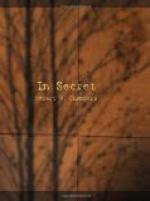Now in this bruised path he stamped the imprints of her two rough shoes in moss and soil, and drove his own iron-shod feet wherever lichen or earth would retain the imprint.
All the footprints pointed one way and ended at the chasm’s edge. And there, also, he left the wicker cage; and one of his pistols, too—the last and most desperate effort to deceive—for, near it, he flung the cartridge belt with its ammunition intact—on the chance that the Hun would believe the visible signs, because only a dying man would abandon such things.
For they must believe the evidence he had prepared for them—this crazed trail of two poisoned human creatures—driven by agony and madness to their own destruction.
And now, slinging on his pack, he made his way, walking backward, to the poisoned spring.
It was scarcely light, yet through the first ghostly grey of daybreak a few birds came; and he killed four with bits of rock before the little things could drink the sparkling, crystalline death that lay there silvered by the dawn.
She was still asleep when he came once more to the bed of leaves between the fallen trees. And she had not awakened when he covered his dry fire and brought to her the broth made from the birds.
There was, in his pack, a little food left. When he awakened her she smiled and strove to rise, but he took her head on his knees and fed her, holding the pannikin to her lips. And after he too had eaten he went to look into the hollow where the tree had stood; and found it brimming with water.
So he filled his bottles; then, with hands and knife, working cautiously and noiselessly he began to enlarge the basin, drawing out stones, scooping out silt and fibre.
All the morning he worked at his basin, which, fed by some deep-seated and living spring, now overflowed and trickled down into the dry gully below.
By noon he had a pool as large and deep as a bathtub; and he came and sat down beside her under the fallen mass of branches where she lay watching the water bubble up and clear itself of the clouded silt.
“You are very wonderful, Kay,” she sighed, but her bruised lips smiled at him and her scarred hand crept toward him and lay in his. Seated so, he told her what he had done in the grey of morning while she slept.
And, even as he was speaking, a far voice cried through the woods—distant, sinister as the harsh scream of a hawk that has made its kill.
Then another voice shouted, hoarse with triumph; others answered, near and far; the forest was full of the heavy, ominous sounds. For the Huns were gathering in eastward from the wooded western hills, and their sustained clamour filled the air like the unclean racket of vultures sighting abomination and eager to feed.
McKay laid his loaded pistol beside him.
“Dear Yellow-hair,” he whispered.
She smiled up at him. “If they think we died there on the edge of the precipice, then you and I should live.... If they doubt it they will come back through these woods.... And it isn’t likely that we shall live very long.”




